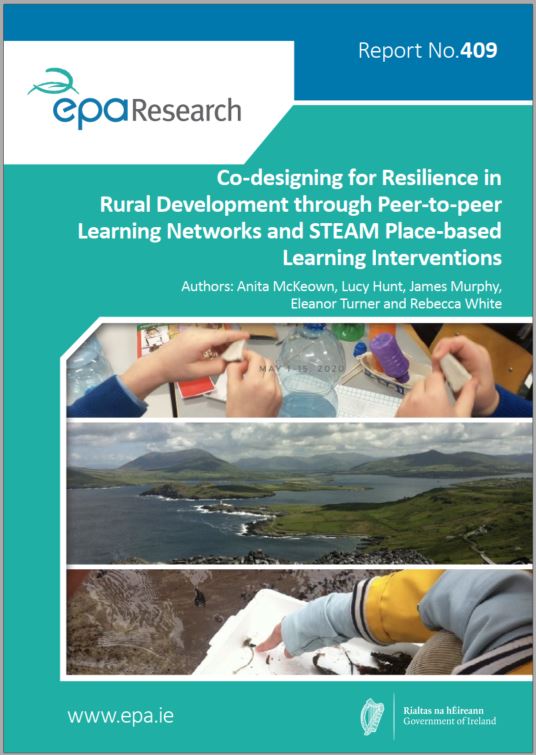Research 409: Co-designing for Resilience in Rural Development through Peer-to-peer Learning Networks and STEAM Place-based Learning Interventions
Authors: Anita McKeown, Lucy Hunt, James Murphy, Eleanor Turner and Rebecca White
Summary: The United Nations 17 Sustainable Development Goals (SDGs) and the 2030 Agenda for Sustainable Development require governments to take ownership and establish frameworks for the achievement of the 17 global goals. Ireland has mapped existing policies and programmes against each of the 169 SDG sub targets, setting out a roadmap for achieving the goals. CoDesRes developed and explored a series of proof-of-concept methods and from this created two toolkits. As interventions, the toolkits (community peer-to-peer learning and place-based STEAM education) localise the implementation of the SDGs and offer insights into adaptive opportunities to engage the public.

Project Highlights
Watch the project highlights video
Identifying Pressures
The United Nations 17 Sustainable Development Goals (SDGs) and the 2030 Agenda for Sustainable Development are not legally binding; however, they require governments to take ownership and establish frameworks for the achievement of the 17 global goals, which call for equitable economic growth, social inclusion and environmental protection. The global goals are aspirational. Despite the lack of mandatory or legal requirements for countries to deliver on the goals, Ireland has mapped existing policies and programmes against each of the 169 SDG sub targets, setting out a roadmap for achieving the goals. Although Ireland has had a sustainable development policy for over two decades, to achieve these goals in a meaningful way, the development of a “beyond compliance approach” (which engages civil society) will be necessary. Furthermore, to move beyond a top-down policy approach, localising the SDGs will require new approaches to policy engagement and participation that are easily translated into action through collaborative action between all sectors of society. A systemic approach to the integration of national social, economic and environmental policy and implementation of the SDGs is required.
Informing Policy
Moving the SDGs from a theoretical set of goals from a national plan to a localised tangible vision requires confronting a number of challenges. The global goals offer an opportunity for all sectors of society (citizens, governments and businesses) to collaborate towards shared aims and policy delivery. However, how to do this effectively will be an ongoing dynamic process rather than any single solution. Novel creative methodologies and processes that create local opportunities to participate in the national delivery of the SDGs and capture these efforts are under-researched because the 2030 Agenda, a 15-year programme, was only recently created. To date, CoDesRes (CoDesigning for Resilience in Rural Development through Peer-to-Peer Learning Networks and STEAM Place-based Learning Interventions) is the only research project in Ireland that has considered and sought to integrate place-based STEAM (science, technology, engineering, arts and mathematics) educational interventions with arts-led community development activities. CoDesRes adapted a novel, innovative and systemic methodology that contributes to localising the SDGs by creating knowledge exchanges and building capacity to reimagine locally engaged activities.
Developing Solutions
CoDesRes developed and explored a series of proof-of-concept methods and from this created two toolkits. As interventions, the toolkits (community peer-to-peer learning and place-based STEAM education) localise the implementation of the SDGs and offer insights into adaptive opportunities to engage the public. The project considered that the rural context has a vital role to play in developing viable realistic alternatives to urban dwelling and support citizen-led resilience. CoDesRes sought to reimagine equitable green and blue opportunities within a rural area. The Iveragh Peninsula offered a prime location to explore the opportunities for citizens to localise the SDGs within a rural setting and utilise existing policy for local resilience.
Through STEAM place-based educational interventions, community activities and peer-to-peer knowledge networks, the process trialled an adaptive change model for complex systems. CoDesRes utilised creativity, innovation and practical processes to develop home-grown solutions to global concerns from the inside out. In this project, which works towards the 2030 Agenda, beta resources (structured around SDGs 4, 11, 14 and 15) built capacity for systemic approaches and encouraged self-organisation and localised resilience by reimagining local and rural possibilities.
https://www.epa.ie/media/epa-2020/research/epa-funded-research/Report-cover-409.jpg